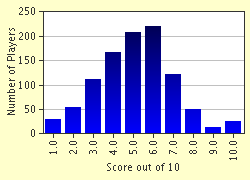Quiz Answer Key and Fun Facts
1. As dogs get older, their metabolism changes and their need for calories decreases. This is also true for cats.
2. Dry skin can be a problem for older cats. Brushing your cat can help spread natural oils through the coat by stimulating which gland?
3. The movement of food through a cat's digestive tract slows with age, therefore constipation is very common in older cats. Which of the following is NOT a contributing factor to this condition?
4. As a cat's heart ages, it can not pump as much blood in a given amount of time. Cats can develop a disease of the heart muscle called ______.
5. Owners of older cats may notice an increase in water consumption and urination. These are frequently signs of kidney disease. Generally, these signs don't occur until what percentage of the kidney function is lost?
6. Older cats may experience hearing loss. This is often severe before the owner is aware of the problem. To prevent your cat from being startled, how can you let him, or her know you are approaching?
7. Older cats may have difficulty going up and down stairs, or jumping onto their favorite perches. This decreased mobility due to stiffness of the joints is known as ______.
8. Which of the following is NOT a behavioral change in older cats due to stress?
9. As cats age, their ability to regulate their body temperature stays the same.
10. Unspayed female cats may have some hardening of the mammary glands as they age, or they may develop cancer. Approximately what percentage of mammary tumors in cats are malignant?
Source: Author
catnippin
This quiz was reviewed by FunTrivia editor
crisw before going online.
Any errors found in FunTrivia content are routinely corrected through our feedback system.


